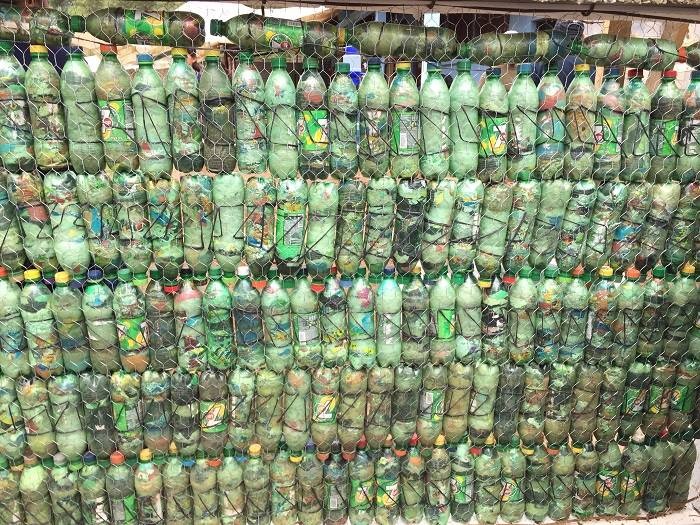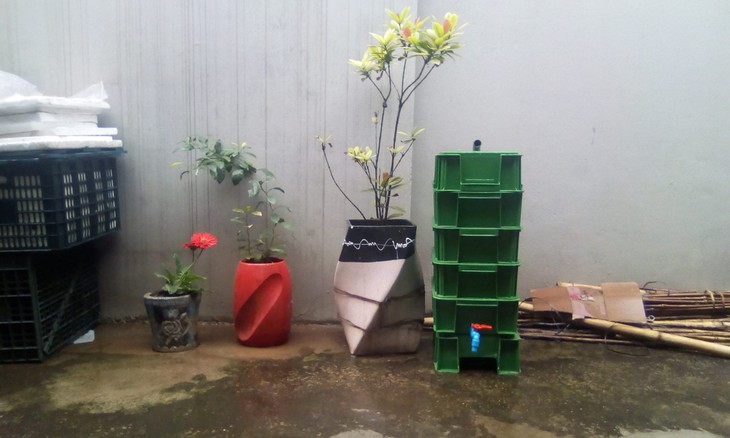(VOVWORLD) - Around the world, the rate of waste generation is rising. In 2016, the worlds’ cities generated more than 2 billion tons of solid waste, approximately 0.7 kilograms per person per day, according to the World Bank. The organization estimates that rapid population growth and urbanization will cause annual waste generation to increase by 70% from 2 billion tons in 2016 to 3.4 billion tons in 2050. If stopping the “eat-waste-feel bad” routine is one of your new year’s resolutions, listen to environmentalist Nguyen Nam Ha, the founder of a company called Happy Bamboo, describe the zero-waste lifestyle.
Ha conducts free workshops on the trash-free lifestyle every other weekend at Zenith Yoga on Kim Ma street in Hanoi. Ha says he wants to make more people aware of environmental pollution. He said: “I love nature so much. I feel sad when I see humans are destroying our planet. Years of experience in construction taught me that construction is the second biggest source of pollution, so I decided to change to natural building. You can adopt the green lifestyle, starting right in your own house.”
Looking at trash as a resource, Ha shows workshop participants how to sort, reuse, and recycle their household waste. While cardboard and metal can be sold to scrap dealers, plastic items and organic waste have to go to overloaded centralized waste treatment centers. Vietnam produces more than 27.8 million tons/year of waste, according to a 2018 survey by the Netherlands Enterprise Agency. Ha says that by reducing, reusing, and recycling plastics and organic waste, we can help save the earth. Making ecobricks is one way to recycle plastic bottles and bags. Ha told us: “An Ecobrick is a plastic bottle packed to a set density with used, clean, dry plastic to creat a building block that can be used over and over again. Plastics in the biosphere disrupt the life cycles. Ecobricking allows a long-term retention and control of materials that otherwise would become toxic. Ecobricks make use of a problem – the longevity of plastic – to seal the potential toxins away.”
 Ecobricks Ecobricks |
Participants are encouraged to bring their own plastic bottles and nylon to the workshop to make their own ecobricks. Anyone can make them, since no machines or special skills are required. They can use their DIY bricks to make modular furniture, garden landscaping, walls – even full-scale buildings – or sell them to Ha, who uses them to build eco-houses.
At the workshop, Ha introduces his new DIY worm composting bin, which can treat a significant amount of organic waste including soft leftovers such as fruit peels and vegetables. The idea is to build up a stack of connected worm bins or trays, allowing the bins to nest one within the other. The compost is collected in the lower bins. The worm food – kitchen and garden scraps – is consumed in the upper levels of the wormery. When a lower bin is nearly full of worm castings it is emptied and rotated to the top. The compost can be used as plant fertilizers. At the bottom is a built-in compost tea collector tray and spigot for easy draining. A tight-fitting lid protects the worms from sunlight and cold. Compost surprisingly does not smell. The foul odor comes from rotting food that worms have not eaten. If you give them appropriately amount of waste, they will eat the food before it starts to rot.
 Ha's new DIY worm composting bin Ha's new DIY worm composting bin |
Using recycled materials, making a worm bin, Ha says, costs less than 15 USD. He said: “I look for designs that reuse readily available materials. For this bin, I used recycled plastic and Styrofoam boxes that can be found at any market. It’s cheaper but it works really well.”
Many young workshop participants have been inspired to take action to save the environment.
"I’m learning to live in harmony with nature. I’ve been thinking about waste treatment in my own house for a long time. This workshop gave me the motivation to start doing it!"
"I’m very concerned about the environment. I’m going to use a worm bin at my vegetarian restaurant to take advantage of the organic waste.”
"I have adopted a zero-waste lifestyles for several years. There is no nylon in my house. I will practice the organic waste treatment that Ha demonstrated in my house, then introduce it to my friends and colleagues."